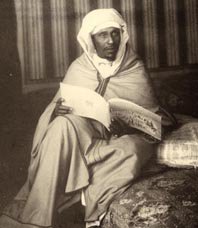
The popular history will tell you the following: Thami el Glaoui, Lord of the Atlas - was a Berber from the Atlas, a warlord, a mountain chieftain. To understand El Glaoui, you must go to the great kasbah at Telouet, to his mountain stronghold. Thami el Glaoui was the chief of the Glaoua tribe in Upper-Atlas mountains and Pasha of Marrakesh. During the French Protectorate (1912-1956), he supported France and opposed to Sultan Mohammed V (1927-1962), who supported Moroccan nationalism and independence. El Glaoui contributed to the overthrow and exile of Mohammed V in 1953. When the Sultan was reestablished in 1955, it was with the help of El Glaoui although he had to present a very humiliating public apology for his earlier actions.
For a long time historians have treated him as a black character and made much of his excesses "Si Hadj Thami el Glaoui, pasha of Marrakesh, caid of Telouet, Berber chief of the Merouara tribe, lord of the Atlas, viceroy of southern Morocco — lived in parallel universes. In 1953, he arrived in London on the boat train from Paris to attend the Queen’s coronation. He had been invited by a man with a weakness for tribal chieftains: Winston Churchill. Just months before, El Glaoui had ordered the severed heads of his enemies mounted atop the gates of his palace in Marrakesh."
Yet it was not black and white. El Glaoui used the French, and was used by the French, for most of El Glaoui's years in power; however, El Glaoui's primary motive was neither radical nor conservative, neither pro-European nor anti-European, neither a modernizer nor a foot-dragger. El Glaoui's overriding motive was to keep the Berber tribes of Central and Southern Morocco united enough, under his control, to prevent them from being completely subjugated by the French, the Arabs, or anybody else.
Yet a more subtle reading of history would suggest there was more to this man. Berber historians will no doubt review the complex role and personality of this towering figure of the twentieth century. He was no man of straw, by any standard, before, after, or during his planned and public submission to the throne. His powerful alliances and astute politics need to be weighed far more subtlety in the context of the French colonization period. This formidable Berber warrior, politician, and leader, who steered the politics of Morocco for over half a century, consciously made a decision for the benefit of all Moroccans as a very old man on the brink of death. Morocco and its freedom from the yoke of Europe was his goal. He knew that by asking the French allies to return the Sultan from exile, this Sultan would follow age-old practices of eliminating him, the Glaoui, and his family from positions of power in Morocco, and that his vast holdings would be confiscated. Yet, for the good of Morocco he did this.
Tags: Morocco, Fès, travel, Fez,

2 comments:
Hi Hujaina,
Dar Bennis is not our Riad... it belongs to an American friend. Riad Zany is our riad. Riad Zany was one of seventeen houses that el Glaoui owned in Fes. After the Sultan returned he did not execute el Glaoui but he did say he could live in Fes but could never sell his houses.
It is true that many Fasi do not apprteciate the value and history of their old riads and dars, but it is also true that most do not have the money to maintain them. That is why I think it is a good thing for people like David and us to buy a riad and to restore them to their former glory and to employ local crafts people to use their traditional crafts in the restoration.
So you do not think that calling our house Riad el Glaoui would be a bad thing?
Have a good party!
I will take your advice! Thank you.
Post a Comment